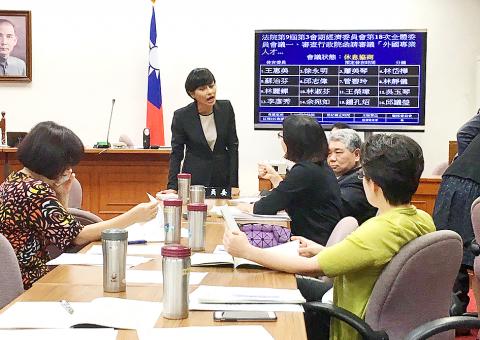Democratic Progressive Party (DPP) lawmakers are divided over whether a draft bill to relax restrictions on foreign graduates seeking internships in Taiwan would create a loophole for firms to introduce cheap foreign workers and lower average salaries.
The Cabinet has proposed granting one-year visas to foreign college graduates within two years of their graduation and a two-year internship visa to specialists in the fields of science, technology, engineering and math.
At present, only current students can apply for internship visas, not graduates.

Photo: CNA
The bill would also relax constraints on residence and work permits, taxation, healthcare and retirement benefits to attract foreign white-collar workers to make up for a brain drain Taiwan is experiencing and boost the nation’s competitiveness.
The Cabinet draft is under review at the legislature.
DPP Legislator Lin Shu-feng (林淑芬) on Monday said that the internship rules were only made to relieve “the shortage of cheap white-collar workers for businesses.”
While businesses are required to pay at least NT$47,971 per month for a foreign white-collar worker, there is no minimum or maximum on intern salaries, which Lin said would allow businesses to hire cheap workers instead of high-salaried specialists.
The outflow of white-collar workers Taiwan is experiencing has been caused by wage stagnation, and easing rules on internship visas would only prolong the stagnation, Lin said.
“If foreign graduates are allowed to intern in Taiwan within two years of their graduation, will they take over low-level white-collar jobs?” Lin said on Facebook.
DPP Legislator Karen Yu (余宛如) has come under fire for her support of the Cabinet’s proposal.
Yu said the National Development Council estimates that the relaxation would have a limited effect on Taiwan’s labor market, and the legislation would only allow for an increase of 200 foreign interns per year.
There were only 458 foreign interns last year, and increasing that number would hardly affect the job market, regardless of the interns’ salary level, Yu said.
“Is it not strange to link the wage stagnation problem of Taiwan’s job market — which has more than 10 million workers — with that handful of foreign interns?” she said.
The law was drafted taking into account the immigration laws of other nations, she said.
Changes must be made to the industrial structure to enable Taiwan to compete in the future, she said.

A Chinese aircraft carrier group entered Japan’s economic waters over the weekend, before exiting to conduct drills involving fighter jets, the Japanese Ministry of Defense said yesterday. The Liaoning aircraft carrier, two missile destroyers and one fast combat supply ship sailed about 300km southwest of Japan’s easternmost island of Minamitori on Saturday, a ministry statement said. It was the first time a Chinese aircraft carrier had entered that part of Japan’s exclusive economic zone (EEZ), a ministry spokesman said. “We think the Chinese military is trying to improve its operational capability and ability to conduct operations in distant areas,” the spokesman said. China’s growing

Taiwan yesterday denied Chinese allegations that its military was behind a cyberattack on a technology company in Guangzhou, after city authorities issued warrants for 20 suspects. The Guangzhou Municipal Public Security Bureau earlier yesterday issued warrants for 20 people it identified as members of the Information, Communications and Electronic Force Command (ICEFCOM). The bureau alleged they were behind a May 20 cyberattack targeting the backend system of a self-service facility at the company. “ICEFCOM, under Taiwan’s ruling Democratic Progressive Party, directed the illegal attack,” the warrant says. The bureau placed a bounty of 10,000 yuan (US$1,392) on each of the 20 people named in

Nine retired generals from Taiwan, Japan and the US have been invited to participate in a tabletop exercise hosted by the Taipei School of Economics and Political Science Foundation tomorrow and Wednesday that simulates a potential Chinese invasion of Taiwan in 2030, the foundation said yesterday. The five retired Taiwanese generals would include retired admiral Lee Hsi-min (李喜明), joined by retired US Navy admiral Michael Mullen and former chief of staff of the Japan Self-Defense Forces general Shigeru Iwasaki, it said. The simulation aims to offer strategic insights into regional security and peace in the Taiwan Strait, it added. Foundation chair Huang Huang-hsiung

PUBLIC WARNING: The two students had been tricked into going to Hong Kong for a ‘high-paying’ job, which sent them to a scam center in Cambodia Police warned the public not to trust job advertisements touting high pay abroad following the return of two college students over the weekend who had been trafficked and forced to work at a cyberscam center in Cambodia. The two victims, surnamed Lee (李), 18, and Lin (林), 19, were interviewed by police after landing in Taiwan on Saturday. Taichung’s Chingshui Police Precinct said in a statement yesterday that the two students are good friends, and Lin had suspended her studies after seeing the ad promising good pay to work in Hong Kong. Lee’s grandfather on Thursday reported to police that Lee had sent